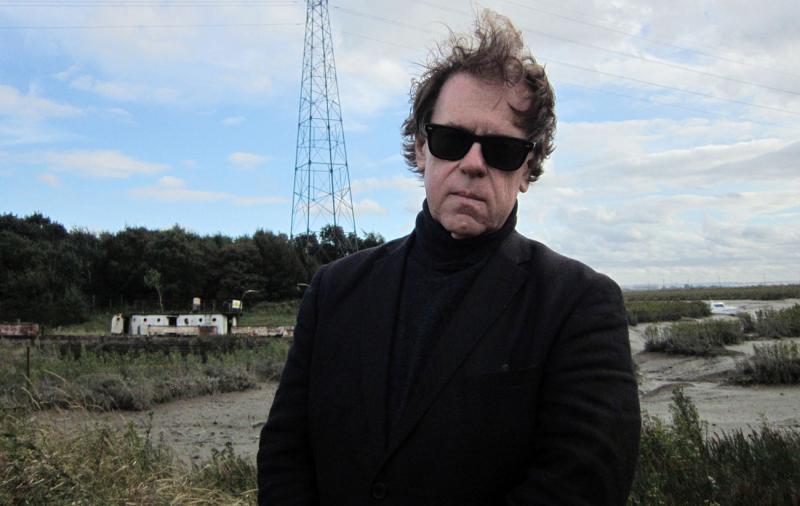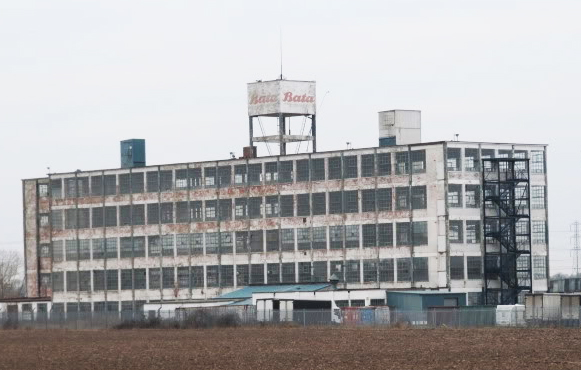Jonathan Meades: The Joy of Essex, BBC Four | reviews, news & interviews
Jonathan Meades: The Joy of Essex, BBC Four
Jonathan Meades: The Joy of Essex, BBC Four
Virtuoso trip through an unknown Essex by thuggish telly-auteur

For a man who lives in an agreeable region of France, Jonathan Meades grew strangely passionate in the course of this fascinating excursion around Essex. The thuggish-looking narrator travelled by small, functional Toyota rather than Magical Mystery Tour-style charabanc, though the latter would have been perfectly apt for tales of Cockneys seeking escape in the county described by one sneering commentator as "the dustbin of London".
The word "Essex" arrives dragging heaps of clanking debris attached to its rear bumper, and Meades began his odyssey with an extended demolition of Essex-related preconceptions (the county having suffered badly from what he termed "Place-ism"). Things we would not be seeing included pink stretch limos, "diamond geezers and geezer-ettes", "reality TV cretins", the "friends of Richard Desmond", "hair extension executives" and much more. No TOWIE here.
He ended on an elegiac note, lamenting the slow death of 'the People's Essex'
Instead, Meades - continuing his splendidly fruitful laison with director Francis Hanly - had unearthed a largely forgotten yet, when he delved into the details, a remarkably still-present alternative Essex. Sometimes Meades's unforgivingly literate approach sounds as if he's taunting the medium of television and goading it to take him on, but the contours of his argument emerged steadily.
From the late 19th century to the eve of World War Two, the county was a teeming breeding ground for all manner of collectivist, Utopian, socialistic and morally-improving experiments. The Salvation Army's founder William Booth established a 3,000-acre "land and industrial colony" at Hadleigh, to reform "broken men of bad habits" with fresh air, hard work, and the prospect of profiting from their labours when the colony's produce was shipped by barge to the London markets. The labourers themselves were frequently shipped off to the colonies, possibly involuntarily. Frederick Charrington, from the brewing clan, forsook the family's staple earner and created a teetotal retreat on Osea Island in the Blackwater estuary (whose tidally submersible causeway featured eerily in the film The Woman in Black).
 Meades rattled off a list of cult-like startups which had flourished briefly - New Harmony, the Village Society, the Redemption Society - and detoured to the sinister-sounding Q Camp at Hawkspur Green, where the homeless and the drug-addicted experienced "tough love". They may even have been subjected to the libido-liberating Frigidity Machine, created by Theodore Faithfull, grandfather of dowager-chantoosie Marianne.
Meades rattled off a list of cult-like startups which had flourished briefly - New Harmony, the Village Society, the Redemption Society - and detoured to the sinister-sounding Q Camp at Hawkspur Green, where the homeless and the drug-addicted experienced "tough love". They may even have been subjected to the libido-liberating Frigidity Machine, created by Theodore Faithfull, grandfather of dowager-chantoosie Marianne.
In Thaxted, the anti-semitic priest Conrad Noel, also a supporter of Fenianism and Marxism, revived a slew of pre-industrial folk ritual and lore, to Meades's disgust. "Liberals want everyone to be like them and to be grateful to them," he fumed. "Utopias are almost by definition bound to fail."
He was, as usual, especially illuminating about architecture, unearthing some fine specimens of an English Modernist style which, he argued, was more potent than is generally supposed. He took us to the "paternalistic Utopia" created by Czech shoe magnate Tomas Bata in East Tilbury, with its boldly- conceived houses, clinic, community centre and factory. The workers' dwellings built by Crittall Windows in 1918, Meades mused, may have been Britain's first Modernist houses (Bata's disused factory, pictured above).
Yet while he admired such specimens of energy and vision, Meades also hates the regulated, the mun dane, and being made to join in with things. "Accessibility means nothing more than being comprehensible to morons," he snapped, sounding like a classical music critic. As for the Crittall collective ethic, this meant that "the full horror of team spirit was enjoyed by all." The kind of central planning ethos that brought post-war monstrosities like Basildon and Harlow to Essex triggered this fusillade: "Planners are people who, like scum-of-the-earth politicians, are life's prefects. Social and/or emotional cripples whose mission is to tell us what to do, and what not to do."
dane, and being made to join in with things. "Accessibility means nothing more than being comprehensible to morons," he snapped, sounding like a classical music critic. As for the Crittall collective ethic, this meant that "the full horror of team spirit was enjoyed by all." The kind of central planning ethos that brought post-war monstrosities like Basildon and Harlow to Essex triggered this fusillade: "Planners are people who, like scum-of-the-earth politicians, are life's prefects. Social and/or emotional cripples whose mission is to tell us what to do, and what not to do."
He ended on a sorrowful, elegiac note, lamenting the slow death of "the People's Essex" - or even "an Essex on the sly, a Cockney Shangri-La" - and its eccentric, characterful shacks, smallholdings and rickety wooden bungalows. All of this is being steadily picked off by centralised regulation and, no doubt, corporate self-interest.
"Everything decomposes, everything fades, rusts, rots," he brooded, gazing out across silent mudflats. "Everything returns to the immemorial ooze." A pair of legs protruded surreally from the mud, in ironic echo perhaps of the "Two vast and trunkless legs of stone" from Shelley's Ozymandias. The lone and level sands stretched far away.
Add comment
The future of Arts Journalism
You can stop theartsdesk.com closing!
We urgently need financing to survive. Our fundraising drive has thus far raised £49,000 but we need to reach £100,000 or we will be forced to close. Please contribute here: https://gofund.me/c3f6033d
And if you can forward this information to anyone who might assist, we’d be grateful.

Subscribe to theartsdesk.com
Thank you for continuing to read our work on theartsdesk.com. For unlimited access to every article in its entirety, including our archive of more than 15,000 pieces, we're asking for £5 per month or £40 per year. We feel it's a very good deal, and hope you do too.
To take a subscription now simply click here.
And if you're looking for that extra gift for a friend or family member, why not treat them to a theartsdesk.com gift subscription?
more TV
 The Monster of Florence, Netflix review - dramatisation of notorious Italian serial killer mystery
Director Stefano Sollima's four-parter makes gruelling viewing
The Monster of Florence, Netflix review - dramatisation of notorious Italian serial killer mystery
Director Stefano Sollima's four-parter makes gruelling viewing
 The Diplomat, Season 3, Netflix review - Ambassador Kate Wyler becomes America's Second Lady
Soapy transatlantic political drama keeps the Special Relationship alive
The Diplomat, Season 3, Netflix review - Ambassador Kate Wyler becomes America's Second Lady
Soapy transatlantic political drama keeps the Special Relationship alive
 The Perfect Neighbor, Netflix review - Florida found-footage documentary is a harrowing watch
Sundance winner chronicles a death that should have been prevented
The Perfect Neighbor, Netflix review - Florida found-footage documentary is a harrowing watch
Sundance winner chronicles a death that should have been prevented
 Murder Before Evensong, Acorn TV review - death comes to the picturesque village of Champton
The Rev Richard Coles's sleuthing cleric hits the screen
Murder Before Evensong, Acorn TV review - death comes to the picturesque village of Champton
The Rev Richard Coles's sleuthing cleric hits the screen
 Black Rabbit, Netflix review - grime and punishment in New York City
Jude Law and Jason Bateman tread the thin line between love and hate
Black Rabbit, Netflix review - grime and punishment in New York City
Jude Law and Jason Bateman tread the thin line between love and hate
 The Hack, ITV review - plodding anatomy of twin UK scandals
Jack Thorne's skill can't disguise the bagginess of his double-headed material
The Hack, ITV review - plodding anatomy of twin UK scandals
Jack Thorne's skill can't disguise the bagginess of his double-headed material
 Slow Horses, Series 5, Apple TV+ review - terror, trauma and impeccable comic timing
Jackson Lamb's band of MI5 misfits continues to fascinate and amuse
Slow Horses, Series 5, Apple TV+ review - terror, trauma and impeccable comic timing
Jackson Lamb's band of MI5 misfits continues to fascinate and amuse
 Coldwater, ITV1 review - horror and black comedy in the Highlands
Superb cast lights up David Ireland's cunning thriller
Coldwater, ITV1 review - horror and black comedy in the Highlands
Superb cast lights up David Ireland's cunning thriller
 Blu-ray: The Sweeney - Series One
Influential and entertaining 1970s police drama, handsomely restored
Blu-ray: The Sweeney - Series One
Influential and entertaining 1970s police drama, handsomely restored
 I Fought the Law, ITVX review - how an 800-year-old law was challenged and changed
Sheridan Smith's raw performance dominates ITV's new docudrama about injustice
I Fought the Law, ITVX review - how an 800-year-old law was challenged and changed
Sheridan Smith's raw performance dominates ITV's new docudrama about injustice
 The Paper, Sky Max review - a spinoff of the US Office worth waiting 20 years for
Perfectly judged recycling of the original's key elements, with a star turn at its heart
The Paper, Sky Max review - a spinoff of the US Office worth waiting 20 years for
Perfectly judged recycling of the original's key elements, with a star turn at its heart
 The Guest, BBC One review - be careful what you wish for
A terrific Eve Myles stars in addictive Welsh mystery
The Guest, BBC One review - be careful what you wish for
A terrific Eve Myles stars in addictive Welsh mystery

Comments
I think the pair of legs in
Fascinating, Anon! Still, you
Fascinating, Anon! Still, you have to admit my version is far more pretentious.
It would be, if you could
Meades on Essex - What you
Get what? I'm unsure if
You make it sound far more
What, no mention of Frinton's
Harwich for the